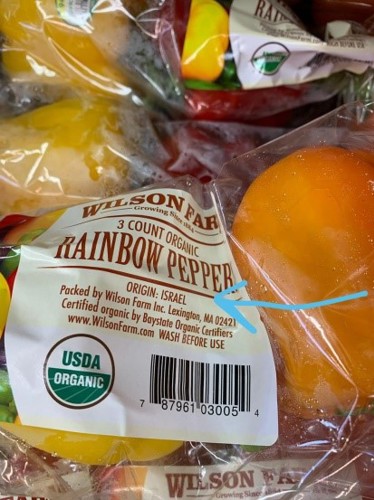Israeli organic peppers in the United States during shemitah

Can a Jew in the US eat organic peppers exported from Israel during Shemitah?
Question: We are now at the middle of Tevet. I just got a message from a friend in the States saying she found veggies in Costco from Israel. Can she buy them? I was always taught during shemitah Israel doesn't export kedushat shevi'it.

Answer in short: These peppers were grown employing heter mechirah, and those who rely on heter mechirah may eat them. While it would seem that those who do not rely on heter mechirah should avoid eating them, there are several reasons to be lenient in this case:
- After investigating the matter, all organic peppers exported to the United States grow in the Northern Aravah.
- The peppers are grown in hothouses
- The peppers now in the market (Tevet) were planted during the sixth year, which means that sefichin is not an issue.
Taken together, there is certainly what to rely on if one wants to be lenient, but nonetheless there is room to be stringent.
Halachic expansion:
In principle, it is forbidden to export shemitah produce from the Land of Israel. This is why otzar beit din does not export its sacred produce abroad. I checked and probably all farmers who export fruits and vegetables signed on a bill of heter mechirah, so your relative can eat them if she eats heter mechirah (and they do not have to be handled as having kedushat shevi'it; some, though, are careful and treat such produce as having kedushah nevertheless).
If your relative does not rely on heter mechirah, she should avoid eating these peppers.
However, these peppers grew in the Northern Aravah: Idan, Hatzevah, and Ein Yahav. What is the halachic status of this area?
See the map of Torah VeHa'aretz Institute of olei Bavel and Mitzrayim and see here a detailed explanation of the borders. This area is south of wadi Tzin, but north of wadi Nekarot (except for some portions of Ein Yahav, which are south of wadi Nekarot or east of wadi Aravah). This area is an area of doubt: according to the Tevu'ot Ha'aretz, anything south of wadi Tzin is not considered olei Bavel, and it stands to reason that it is only part of the gevulot hahavtachah so shemitah laws do not apply there. Alternatively, it would be included in olei Mitzrayim.
According to the Admat Kodesh (the opinion followed by Badatz Eida Chareidit), the border is wadi Nekarot. According to their opinion, the peppers grew in olei Bavel territory (so they would not certify the peppers).
According to Rabbi Elyashiv and Rabbi Efrati, the border is further south; that is, they also do not certify peppers from the northern Aravah.
The position of Torah VeHa'aretz Institute is that this area is an area of doubt and is either olei Bavel or olei Mitzrayim. However, if we consider that they are growing in hothouses (Pe'at Hashulchan is lenient with produce growing in hothouses even if they are not detached from the ground, since this is a doubt based on the interpretation of the Jerusalem Talmud, and today shemitah is rabbinic), and the fact that heter mechirah was performed, it is possible to be lenient.
Moreover, nearly all peppers sold now (Tevet) were planted during the sixth year, which means that sefichin is not an issue. The only issues involved are shamur, ne'evad, and mesaye'ah – the produce was guarded instead of being rendered ownerless, worked in a prohibited manner, and buying it supports wrongdoers. These are more minor issues (as opposed to sefichin), which is another reason for being lenient.
Practical expansion:
Peppers are grown primarily in the Aravah, but also elsewhere in Israel—such as the Jordan Valley, Hof HaCarmel, Sharon, Besor (some of which is olei Mitzrayim). The peppers in question are organic and exported to the United States.
The Ministry of Agriculture's website posts all of the certified organic farmers and notes where they sell their produce: locally, the EU, or the United States. The list includes 50 entries under organic peppers, of which only five growers export to the United States, and they are all from the Aravah: Hatzevah, Ein Yahav, and Idan. There is only one warehouse, in Idan, that exports to the United States.




